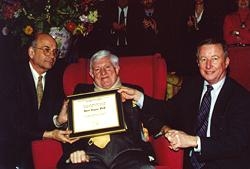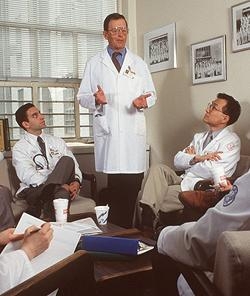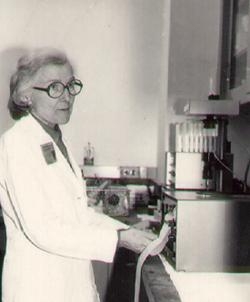Dr. David M. Clayson (1934–2001)

Dr. Clayson receives the Dean's Award for Lifetime Achievement in Teaching presented by Dean Antonio Gotto (right) and Dr. Jack Barchas (left), chairman of the Department of Psychiatry, at the award reception on Feb. 5.
Dr. David M. Clayson, professor emeritus of clinical psychology in psychiatry and former head of psychology at the Payne Whitney Clinic (PWC), died on April 10 after a long illness.
A noted clinician, researcher and educator, Dr. Clayson was head of psychology at Payne Whitney for 25 years (1968–1993). He established PWC's first internship training program in clinical psychology and extended the psychology section's educational and clinical activities to the Hospital for Special Surgery and Memorial Sloan-Kettering Cancer Center.
Dr. Clayson was a leading authority on psychological testing and also contributed to a better recognition of the significant psychological aspects of illness in all areas of medicine.
On Feb. 5 of this year, Dr. Clayson was honored by the Medical College as the first recipient of the Dean's Award for Lifetime Achievement in Teaching (see story in the Dean's Bulletin, February 12, 2001). Other honors that he received at Cornell include the Elliott Hochstein Teaching Award (1983), voted by the graduating class, and election to the Senior List of faculty members selected by graduating seniors in recognition of teaching excellence. He was also honored with election as a faculty member of Cornell's AOA chapter.
Dr. Clayson joined the Medical College as an instructor of psychology in 1963 after receiving his Ph.D. in clinical psychology from Washington University in St. Louis. He spent his entire professional career at Cornell.
He is survived by a brother and several nieces and nephews.
Dr. Helen E. Daniells (1916–2001)

Dr. Jerome DeCosse in a teaching session with medical students and residents.
Dr. Helen E. Daniells, clinical professor emeritus of psychiatry, died on March 23 in Princeton, N.J. Dr. Daniells received her medical degree from Cornell in 1941 and did her residency training at the Payne Whitney Clinic. She also did postgraduate training at the New York Psychoanalytic Institute.
She joined the Cornell faculty as instructor in psychiatry in 1947 and rose through the ranks of the voluntary faculty while pursuing private practice in Princeton. She became clinical professor of psychiatry in 1977 and became emeritus in 1987.
Dr. Daniells is survived by two children, her daughter, Dale Console, and her son, Robert Console.
Dr. Jerome J. DeCosse (1928–2001)
Dr. Jerome J. DeCosse, the Lewis Thomas University Professor and professor of surgery, died at his home in New York on April 25. Dr. DeCosse, who suffered from amyotrophic lateral sclerosis (ALS), continued to work until his death, despite being confined to a wheelchair.
One of the world's leading authorities on colorectal cancer, Dr. DeCosse pioneered important studies of familial polyposis, including some of the first studies of the influence of dietary fibre on the growth of polyps. His long interest in hereditary colorectal cancer produced among the first large registries of patients with familial adenomatous polyposis. These studies provided important information on the development of colon cancer from polyps and established a basis for later advances in molecular genetics.
Dr. DeCosse joined Cornell Unversity Medical College in 1978, when he became chairman of the department of surgery at Memorial Sloan-Kettering Cancer Center. He was professor of surgery and also served as vice chairman of the department at the Medical College. Before joinging MSKCC, he was chairman of the division of surgery at the Medical College of Wisconsin (Milwaukee). He received his M.D. degree from the University of Minnesota Medical School and later earned a Ph.D. in anatomy from the State University of New York, Upstate Medical Center (Syracuse).
Dr. DeCosse's accomplishments earned him many honors throughout his career. Among those that he received from Cornell were the Honorary Alumni Fellowship Award from the Cornell University Medical College Alumni Association (1991) and the first Lewis Thomas University Professorship (1995). A dedicated teacher, Dr. DeCosse was named to the graduating seniors' Senior List of faculty members recognized for excellence in teaching. Most recently, he was a faculty participant in a collaborative educational program called "The Art of Observation: Weill Cornell Medical College and the Frick Collection" in which Weill Cornell medical students sharpen their skills of observation by analyzing visual cues in portraiture and other artworks in the Frick Collection.
Dr. DeCosse is survived by his wife, Sheila, and their five children. Memorial gifts to establish an endowed professorship in Dr. DeCosse's name may be sent to the Office of Development, Weill Medical College, 1300 York Ave., NY, NY 10021.
Dr. Helena Gilder (1913–2001)

Dr. Helena Gilder
Dr. Helena Gilder, who was associated with the Medical College for more than 60 years, died on April 13. She was adjunct associate professor in the Departments of Biochemistry and Pediatrics at the time of her death.
Dr. Gilder received her M.D. from Cornell University Medical College in 1940. After completing an internship in medicine, she received three successive fellowships for research at the Rockefeller Institute Hospital (1941–1945). In 1946, she joined the Medical College, where she was a research associate in the Departments of Biochemistry (1946–1949) and Surgery (1949–1952). In 1952, she received joint appointments in the Departments of Biochemistry and Surgery as assistant professor of biochemistry. In 1964, she became associate professor of biochemistry and held that appointment until 1980, when she became a member of the adjunct faculty in the Department of Biochemistry.
Dr. Gilder spent her entire career in research. Her publications begin with a paper on antitoxin effects on pneumonia, published in the Journal of Experimental Medicine in 1936, when she was a medical student, and concluded with a paper on bone phospholipid metabolism, published in Calcified Tissue International in January 1996. Throughout her career, her research focused primarily on the physiological and metabolic consequences of different disease states, with very early contributions in such diverse areas as the physiological effects of hypophysectomy and analysis of muscle metabolism in muscular dystrophy. Her main research was performed in the Department of Surgery, where she carried out a broad series of metabolic studies of surgical patients, accompanied by experimental animal studies, aimed at analyzing and decreasing the physiological and metabolic complications that can follow surgery or other injury. This work included a detailed biochemical analysis of the mechanism by which oxygen can damage the lining of the lung, demonstrating how oxygen affects the synthesis of protective lung phospholipid and ultimately led to her studies, at the Hospital for Special Surgery, of phospholipid metabolism in bone, which she did with Dr. Adele Boskey, professor of biochemistry, who is director of research at HSS.
Dr. Gilder was active in the Women's Medical Association of New York City and was a past president of the association (1978–1980). In 1981, she co-authored a paper published in JAMA (November 20, 1981) on "Advancement of Men and Women in Medical Academia: A Pilot Study" (with lead author Dr. Lila Wallis, clinical professor of medicine at Weill Cornell, et al.).
Dr. Gilder is survived by four children: Dr. Rodman Miller, Virginia Miller, A. Amasa Miller Jr. and Julia Hartman.
Dr. Donald M. Shafer (1911–2001)

Dr. Donald M. Shafer
Dr. Donald M. Shafer, clinical professor emeritus of ophthalmology and former acting chairman of the Department of Ophthalmology, died on April 4 in Clearwater, Fla. He had been retired since 1979.
Dr. Shafer received his M.D. from Cornell University Medical College in 1936 and completed his residency training in ophthalmology at Manhattan Eye, Ear & Throat Hospital (MEETH). Remaining at MEETH, Dr. Shafer served as surgeon director (1957–1978) and as chairman of ophthalmology (1974–1978).
He also joined the faculty of the Medical College in 1958, when ophthalmology was a division of the Department of Surgery. After ophthalmology achieved departmental status, Dr. Shafer served as acting chairman of the department from 1968 to 1979.
In the 1950s, Dr. Shafer developed an innovative method, known as "Shafer's sign," for detecting retinal detachments. His work in vitreoretinal disease contributed to the development of procedures to remove and replace the vitreous, allowing for the repair of complex retinal detachment.
Dr. Shafer is survived by his wife of 63 years, Ann Shafer, and their two daughters.

